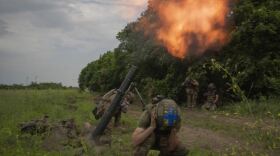NOEL KING, HOST:
The Federal Reserve has announced aggressive new steps to help keep U.S. businesses afloat during the coronavirus pandemic. Despite that, stocks fell this morning after the opening bell. NPR's chief economics correspondent, Scott Horsley, is on the line. Good morning, Scott.
SCOTT HORSLEY, BYLINE: Good morning, Noel.
KING: So the Fed was already taking steps to pump money into the banking system. What did they announce today that's new?
HORSLEY: Well, first of all, they're going to pump even more money into the banking system. Earlier, the Fed had announced plans to buy at least $700 billion worth of Treasurys and mortgage-backed securities. Now the central bank is basically saying the sky's the limit, and it will buy securities, quote, "in the amounts needed to support smooth market functioning." So the lid is off.
The Fed is also setting up several new lending mechanisms to get credit flowing to parts of the economy where it's not flowing properly right now, including one that would effectively make bridge loans directly to big corporations. Now, this is on top of the measures the Fed had already announced to help facilitate short-term financing for businesses.
And the central bank also says it's working on what it calls a Main Street Business Lending Program to support lending to medium-size companies, although details of that program still have to be worked out.
KING: What does this mean exactly? I mean, there are businesses like the airline industry. There are businesses like - small businesses, like restaurants, that have just seen their customer base disappear, right? Nobody's using their services. So what would these steps mean for them in practice?
HORSLEY: The goal of these programs is to help those companies that have seen an abrupt drop in business survive long enough to get to the far side of this pandemic. It's kind of an economic ventilator to keep the economy breathing even as so many people are hunkered down at home so that eventually, when these restrictions on movement are lifted, and people are allowed to go back to work or go back out to something resembling normal life, the businesses will still be there for them.
Federal Reserve officials say the moves they made last week do seem to be having some positive effects in credit markets for things like commercial paper, which companies use to finance short-term operations, and they hope these new lending programs will also have a beneficial effect.
KING: And yet the Fed makes this announcement a little before 9 this morning. Markets open at 9:30, and they are down. What's that telling us?
HORSLEY: Yeah, stocks are down the first few minutes of trading. The Dow is down about 2 3/4%, the S&P 500 just under 3%. The slump might have been worse had the Fed not made this announcement.
KING: Yeah.
HORSLEY: Overnight stock markets futures had fallen 5% before trading was automatically halted because investors were worried when a procedural vote in the Senate failed. Lawmakers are still working on that rescue bill, which is supposed to provide a trillion dollars' or more help to businesses and individuals. And they're still working, and that bill is expected to come through at some point, but, as often happens in Congress, it's taking a little time.
KING: Scott, we're into now week 2 of social distancing to slow the spread of the virus. Some states, obviously some cities, have adopted even stricter lockdowns. Any sense of when this ends? Do things go back to normal when people can leave their homes, go back to work?
HORSLEY: That's certainly the hope, although we don't know when that will be. You know, the economy has never hit the brakes like this before. And this is an engineered recession. We're making this deliberate choice to shut down big chunks of the economy in order to slow the spread of the coronavirus. There are really scary forecasts of what kind of slowdown we're going to see in the next few months. But if there's any bright side, some forecasters do see a relatively quick rebound, provided we get a handle on the pandemic.
KING: OK. NPR's Scott Horsley. Scott, thanks so much.
HORSLEY: You're welcome.
(SOUNDBITE OF MUSIC) Transcript provided by NPR, Copyright NPR.





